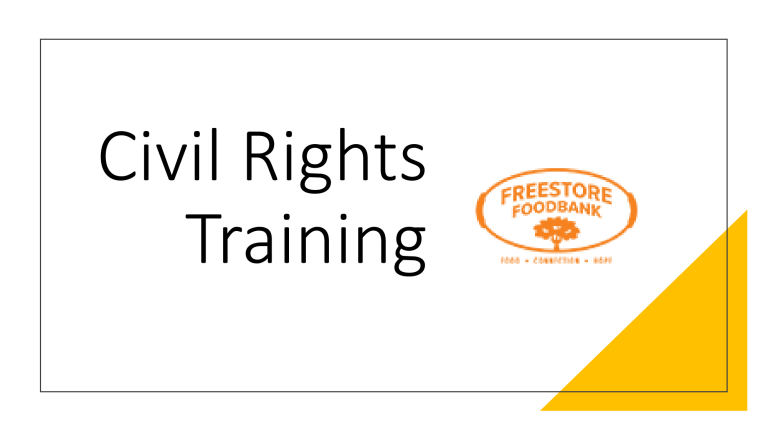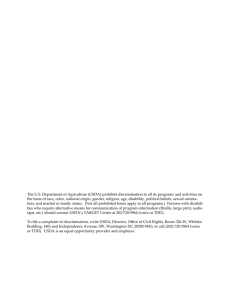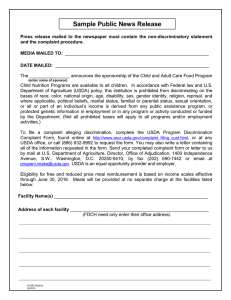
Civil Rights Training Training Agenda • Why do I need training? • What are key topics I need to know? • Where did these Civil Rights concepts come from? • What if I run a program through a faith based organization? • What exactly is discrimination? • What about people with limited access to my food program? • What happens if someone wants to file a complaint? Why Civil Rights Training? • Your program is a recipient of Federal funding by receiving TEFAP food • The USDA requires that all recipients of federal funding go through annual Civil Rights Training. Take Home Messages • • • • • Treat everyone with respect and dignity. Annual Civil Rights training and documentation for staff/volunteers. Display appropriate postings at your food program locations. Document any refused service instances. Include the Non-Discrimination statement in all public materials. What is TEFAP ? • Aids low-income Americans with emergency food and nutrition. • USDA provides food to States for distribution to recipient agencies. • Recipient agencies are nonprofit organizations providing food assistance. What is CSFP? • Supplements diets of elderly (60+ years) with nutritious USDA foods. • USDA provides food and administrative funds to States. • States distribute to public and nonprofit local agencies. Understanding Civil Rights CIVIL RIGHTS: RIGHTS OF PERSONAL LIBERTY AS PER THE U.S. CONSTITUTION. GOALS: ENSURE EQUAL TREATMENT, RIGHTS AWARENESS, REMOVE ILLEGAL BARRIERS, AND MAINTAIN DIGNITY AND RESPECT. Partner Agency Responsibilities • Annual training in civil rights for staff and volunteers. • Ensure compliance with civil rights regulations. • Ensure accessibility for disabled and Limited English Proficiency (LEP) individuals. • Avoid supporting inherently religious activities. • Offer public notification, handle complaints, accommodate disabilities, and resolve conflicts. All program staff interacting with customers, including volunteers and supervisors, must receive annual training. Methods include formal presentations, staff meetings, online, or one-on-one review of material. Training should cover: • Federal Financial Assistance • Goals of Civil Rights Staff Training • Agency Responsibilities • Equal Opportunity for Religious Organizations • Discrimination • Disability Accommodations • Limited English Proficiency • Public Notification • Non-Discrimination Statement • Complaints • Data Collection and Reporting • Customer Service and Conflict Resolution • Compliance Civil Right Laws Federal Law prohibits discrimination in program administration based on the following USDA protected classes: • Race • Color • National origin • Age • Sex • Disability Federal laws (e.g., Title VI, Title IX) protect these classes. Equal Opportunity for Religious Organizations Faith Based Organizations CAN: • Receive federal funds to operate emergency feeding programs. • Use space in their facilities without removing religious art or symbols. Faith Based Organizations CAN’T: • Discriminate against individuals on the basis of religion or religious beliefs. • Use USDA funds or product for religious activities. • Distribute religious information to guests. • Make guests participate in a religious activity to receive assistance. • Preach during the food program EXAMPLE: As part of its meal service, a soup kitchen requires a prayer before the meal. Faith Based Organizations Discrimination • Definition: Different treatment which makes a distinction of one person or a group of persons from others; either intentionally, by neglect, or by the actions or lack of actions based on protected classes. • Types: Disparate Treatment, Disparate Impact, Retaliation Disparate Treatment • Intentionally treating someone differently because they belong to a protected class. • EXAMPLE: A pantry doesn’t serve anyone who speaks a language other than English. (Discrimination against National Origin) Disparate Impact • Unfair practices and procedures that are unintentional. • EXAMPLE: In order to ensure that there are interpreters available, a food pantry wants to mandate that all Russian speaking participants be served on the second Friday of each month. Retaliation • Negative treatment of an individual due to their prior civil rights activity or for cooperating with an investigation. • EXAMPLE: A participant receiving services has recently filed a discrimination claim against your program. Upon their arrival for their next scheduled appointment they are told that they are no longer allowed to receive services Accessibility Considerations Address physical access for persons with disabilities. Ensure services for those with Limited English Proficiency (LEP). Solutions to Consider: Physical Access • Completing registration and shopping in another area of the building that is accessible. • Having an authorized representative/proxy pick up groceries for the person. • Making home deliveries or providing other accommodations. • Talking with the customer to see what might work best for their situation. Limited English Proficiency (L.E.P) L.E.P. - Individuals with limited English proficiency do not speak English as their primary language and have limited ability to read, speak, write, or understand English. • All efforts must be made to service LEP individuals. • Agencies can not require LEP individuals to provide their own interpreter to receive services. • Children should not be used as interpreters. • EXAMPLE: Some people come to the pantry and do not speak English. You cannot understand them and have no idea what language they are speaking. You write a note to give to someone saying that they need to return with an interpreter. Public Notification Inform about program availability. Display the NonDiscrimination Statement. Provide complaint filing information. NonDiscrimination Statement In accordance with Federal civil rights law and U.S. Department of Agriculture (USDA) civil rights regulations and policies, the USDA, its Agencies, offices, and employees, and institutions participating in or administering USDA programs are prohibited from discriminating based on race, color, national origin, sex, disability, age, or reprisal or retaliation for prior civil rights activity in any program or activity conducted or funded by USDA. Persons with disabilities who require alternative means of communication for program information (e.g. Braille, large print, audiotape, American Sign Language, etc.), should contact the Agency (State or local) where they applied for benefits. Individuals who are deaf, hard of hearing or have speech disabilities may contact USDA through the Federal Relay Service at (800) 877- 8339. Additionally, program information may be made available in languages other than English. To file a program complaint of discrimination, complete the USDA Program Discrimination Complaint Form, (AD-3027) found online at: http://www.ascr.usda.gov/complaint_filing_cust.html, and at any USDA office, or write a letter addressed to USDA and provide in the letter all of the information requested in the form. To request a copy of the complaint form, call (866) 632-9992. Submit your completed form or letter to USDA by: (1) mail: U.S. Department of Agriculture Office of the Assistant Secretary for Civil Rights 1400 Independence Avenue, SW Washington, D.C. 20250-9410; (2) fax: (202) 690-7442; or (3) email: program.intake@usda.gov. This institution is an equal opportunity provider. Non-Discrimination Statement ALL MARKETING MATERIALS, FLYERS, PICTURES, OR OTHER ADVERTISEMENTS ON PAPER OR ONLINE INFORMATION RELATED TO YOUR TEFAP OR CSFP PROGRAM MUST INCLUDE THE FULL NONDISCRIMINATION STATEMENT WHEN ABLE TO DO SO. AT A MINIMUM, THE STATEMENT “THIS INSTITUTION IS AN EQUAL OPPORTUNITY PROVIDER” MUST BE INCLUDED IN PRINT NO SMALLER THAN THE INFORMATION PROVIDED. Complaints Advise Applicants/ Participants: • About their right to file complaint • How to file complaint • Complaint procedures Complaint Procedures Complaints must be filed within 180 calendar days Complaints must be submitted to FNS within 5 calendar days Complaints may be written or verbal State agencies or subrecipient agencies may develop their own complaint form but use of said form cannot be a prerequisite for acceptance A separate Civil Rights complaint log must be maintained Confidentiality is extremely important and must be maintained when possible but should never be promised Data Collection and Reporting • Does Not discriminate • Provides information in different formats and languages to meet all levels of ability • Reaches underserved groups • Uses the USDA non-discrimination statement (This Institution is an Equal Opportunity Provider) • Uses photos and graphics that convey equal opportunity in program-related information. • Prominently display the mandatory “And Justice For All” poster. Data Collection and Reporting • All data collected must be kept secure and confidential • Maintain all records ; TEFAP and CSFP 5 years • CSFP regulations require annual reporting of participants’ racial and ethnic data. Participants may self-declare racial/ethnic data. If a participant refuses to provide data they are to be advised that the information will be collected based on observation. • Outreach efforts can be targeted to groups not adequately represented in program participation. “Treat others the way you would like to be treated.” • Make everyone feel welcome • Be patient • Be polite • Be empathetic Customer Service Conflict Resolution Three Simple Rules 1. Remain calm with your posture and tone. 2. Try to explain your understanding of the situation. 3. Get help, especially if threats are made or if violence is possible. Have a written and posted policy for dealing with unacceptable behavior and conflicts. Right to Refuse Service Questions?


